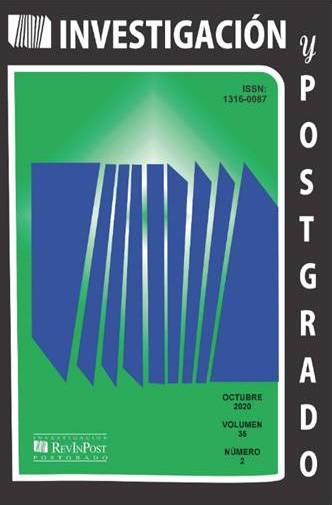NECESIDADES DE LA GESTIÓN DEL CONOCIMIENTO EN LA ENSEÑANZA DEL INGLÉS
DOI:
https://doi.org/10.56219/investigacinypostgrado.v35i2.2784Palabras clave:
enseñanza del inglés, gestión del conocimiento, necesidades educativasResumen
El propósito de este artículo fue determinar las percepciones de los profesores sobre la gestión del conocimiento desde un enfoque integrador, con el fin de lograr el mejoramiento del proceso de enseñanza del inglés como lengua extranjera en una institución universitaria. Se consideraron los aspectos esbozados desde las concepciones teóricas de Stankosky (2005) y Larsen-Freeman (2013), y se propusieron elementos desde una perspectiva sistémica. Para ello se empleó el método cualitativo de un estudio de caso. Las técnicas utilizadas fueron la observación y la entrevista y como instrumentos el cuestionario y el cuaderno de bitácora. Los resultados mostraron que existen algunos constructos que prevalecen de forma destacada, por lo cual pudieran ser abordados como una propuesta para un diseño de gestión de conocimiento enfocado en el mejoramiento del proceso de enseñanza del inglés.
Descargas
Citas
Alavi, M. y Leidner, D.E. (2001). Review: Knowledge management and knowledge management systems: Conceptual foundations and research issues. MIS Quarterly, 25, 107-136.
Bernbom, G. (2001). Information Alchemy: The Art and Science of Knowledge Management. EDUCAUSE Leadership Series No. 3. San Francisco: Jossey-Bass.
Borg, S. (2006). Teacher cognition and language education: Research and practice. Londres: Continuum.
Castells, M. (2006). The Network Society: from Knowledge to Policy. Washington: Center for Transatlantic Relations.
Davenport, T.H. (1994). Saving IT's Soul: Human Centered Information Management. Harvard Business Review, 72, 119-131. Cambridge, Massachusetts: Harvard University.
Denzin, N. y Lincoln, Y. (2005). Introduction: The discipline and practice of qualitative research, The SAGE handbook of qualitative research. Thousand Oaks, California: Sage.
Gorelick, C., Milton, N. y April, K. (2004). Performance through Learning. Knowledge Management in Practice. Nueva York: Heinemann.
Holac, H. (2008). Learner and teacher autonomy: concepts, realities, and responses. Amsterdam: John Benjamins.
Guba, E., y Lincoln, Y. (2005). Paradigmatic controversies, contradictions, and emerging confluences. The SAGE handbook of qualitative research. Thousand Oaks, California: Sage.
Jacobs, G. y Farrell, T. (2003). Understanding and implementing the CLT (Communicative Language Teaching) Paradigm. RELC Journal, 34, 5-30.
Kidwell, J., Vander, K. y Johnson, S. (2001). "Applying Corporate Knowledge Management Practices in Higher Education." Information Alchemy: The Art and Science of Knowledge Management. EDUCAUSE Leadership Series No. 3. San Francisco: Jossey-Bass. pp. 1-24.
Krahnke, K. (1987). Approaches to Syllabus design for Foreign Language Teaching. Washington, DC: Center for Applied Linguistics.
Larsen-Freeman, D. (2013). Techniques and Principles in Language Teaching. Oxford: Oxford University Press.
Littlewood, W. (1981). Communicative Language Teaching. New York: Cambridge University Press.
Minakata, A (2009). Gestión del conocimiento en educación y transformación de la escuela. Revista Electrónica Sinéctica, 32. Recuperado de http://www.scielo.org.mx/scielo.php?script=sciarttext &pid=S1665109X2009000100008
Nonaka, I. (1994). A Dynamic Theory of Organizational Knowledge Creation. Organization Science, 5, 14-37.
Nonaka, I. y Takeuchi, H. (1995). The Knowledge-Creating Company: How Japanese Companies Create the Dynamics of Innovation. New York: Oxford University Press.
Reuters Staff (2020). Venezuela poverty rate surges amid economic collapse, inflation–study. Recuperado de: https://www.reuters.com/article/venezuela-poverty/venezuela-poverty-rate-surges-amid-economic-collapse-inflation-study-idINL1N2EE1MG
Richards, J. (2006). Communicative Language Teaching Today. New York: Cambridge University Press.
Serenko, A. y Dumay, J. (2015). Citation classics published in knowledge management journals. Part I: articles and their characteristics. Journal of Knowledge Management, 19, 401-431.
Stankosky, M. (2005) Advances in Knowledge Management: University Research Toward an Academic discipline, en Stankosky, M. (Ed.) Creating the Discipline of Knowledge Management. Washington: Heinemann.
Stoller, F. (2002). Content-Based Second Language Instruction. What is it? TESOL. Recuperado de: http://www.carla.umn.edu/cobaltt/CBI.html
Strauss, A. y Corbin, J. (2002). Basics of qualitative research. Techniques and procedures for developing grounded theory. New York: Sage Publications
Thorn, C. (2001). Knowledge Management for Educational Information Systems What Is the State of the Field? Educational Policy Analysis Archives, 9, noviembre 19. Recuperado de http://epaa.asu.edu/epaa/v9n47/
Publicado
Cómo citar
Número
Sección
Licencia
Derechos de autor 2024 Universidad Pedagógica Experimental Libertador

Esta obra está bajo una licencia internacional Creative Commons Atribución-NoComercial-CompartirIgual 4.0.
Investigación y Postgrado está bajo una licencia internacional Creative Commons Attribution-NonCommercial-ShareAlike 4.0 .
La política de acceso abierto y de licencias con “algunos derechos reservados” no niega la propiedad intelectual ni los derechos de los autores respecto a sus artículos, al contrario, los respeta. Es por ello que:
No se reservan los derechos de publicación de los artículos. Los autores podrán distribuir su artículo en cualquier otro medio, siempre y cuando sea sin fines de lucro. Debe informar al Editor de esta nueva publicación y debe dar el crédito a la revista Investigación y Postgrado.













